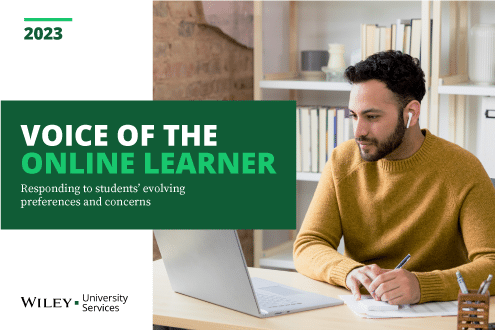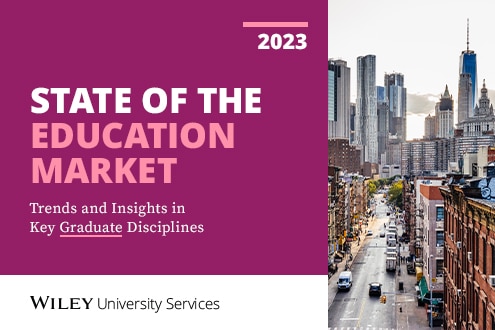Background: A Thriving Partnership
Established in 1920, Loyola Law School (LLS) serves students as a competitive, private Jesuit institution in Los Angeles, California. Through both a beautiful campus and an online learning platform, LLS features a diverse offering of law programs to provide students with the expert skills they need to impact change in their communities. In 2019, LLS partnered with Wiley University Services to transform a select number of its on-ground programs into an interactive online format.
The Challenge: Create Engaging Experiences in Remote Learning Environments
Like most universities, LLS closed its campus in March 2020 due to the COVID-19 global pandemic. When the campus closure was extended through the summer, LLS officials made the decision to transform its on-ground summer tax intensive program into a fully online program.
Since the courses were scheduled to begin immediately following Memorial Day, LLS had approximately eight weeks to transfer the program’s content to its online platform. While the urgency to quickly transform the program was important, the program’s course quality, along with the student learning experience, still remained top priorities.
“We found that most people who had to switch their on-campus classes to online at the last minute encountered big challenges, both for students and professors,” said Jennifer Kowal, Director of Tax LLM Program and Associate Clinical Professor. “We wanted adequate time to prepare so we could make it a high-quality experience for the students.”
LLS chose to leverage its partnership with Wiley to quickly transition the program online. In doing so, Wiley’s instructional design team worked directly with LLS faculty to design outcome-focused courses.
The Strategy: Develop Opportunities for Engagement and Human Interaction
Having developed online programs for LLS, Wiley was able to utilize course content that was already available in the school’s online core tax courses for the summer tax intensive program. However, the content would need to be reorganized and divided among the new online courses.
“So the question was, would it be possible to take what was already built and adjust it to fit this Summer Intensive program?” said Theodore Seto, Professor of Law and Wiley Fellow. “We asked Wiley and they were very happy to help us out.”
Wiley’s academic services team immediately went into action with LLS faculty members to discuss logistics of the on-ground summer tax intensive program. The ultimate goal was to maintain a positive learning experience for students who would now be completing the program online.
LLS’s tax educators met with Wiley’s instructional design team to restructure its existing online content to meet the demanding scheduling needs of the summer tax intensive program and deliver a rigorous but manageable program to new online learners. While prioritizing engagement and human interactions, Wiley and LLS faculty also developed courses with synchronous learning sessions and group work opportunities to allow educators to provide students with direct and personalized attention and support.
“One of the reasons that we were able to move so quickly is because of Wiley’s learning designers. They listen and get things done very quickly,” said Kowal.
The Result: A Successful Program Launch and Opportunities to Expand Marketing
Within the allotted eight weeks, LLS and Wiley worked together to successfully transfer all the summer tax intensive program courses to an online format. The new online course schedule allowed faculty and students to enjoy a high-quality educational experience while following social distancing orders. To continuously promote engagement and human interaction within the program, synchronous sessions now take place up to three times per week. In these sessions, students receive the opportunity to ask questions, discuss the issues they’ve faced while transitioning to online learning, and provide feedback on the conceptual overview of the online learning platform.
In addition to synchronous sessions, students engage in group projects for the first time as part of the summer tax intensive program. In many of these collaborative assignments, groups of up to four students are given a problem which they will solve together and come to a consensus with respect to a single common answer. These types of projects encourage peer-to-peer interactions among students.
“My experience working with Wiley learning designers has been better than I ever could have hoped. I have learned a lot about online education best practices,” said Kowal. “I was a bit nervous because I had heard from other professors that a lot of designers have their way of doing things and they try to fit your class into their mold. But that was not my experience working with Wiley.”
By transferring these on-ground courses to LLS’s online learning platform, Wiley has expanded the market for the summer tax intensive program. LLS is now able to offer this program to students in select states across the country, including individuals who are pursuing their Juris Doctorate at other law schools, and to professionals who want to advance their career with further tax training.
“We looked at a number of partners when we initially started to expand our online programs. It was Wiley’s openness and flexibility that made us decide to partner with them. Our decision has proven to be right,” said Seto.
To learn how to develop quality programs with the flexibility to foster student success during times of disruption, view our COVID-19 Support Services page.

















